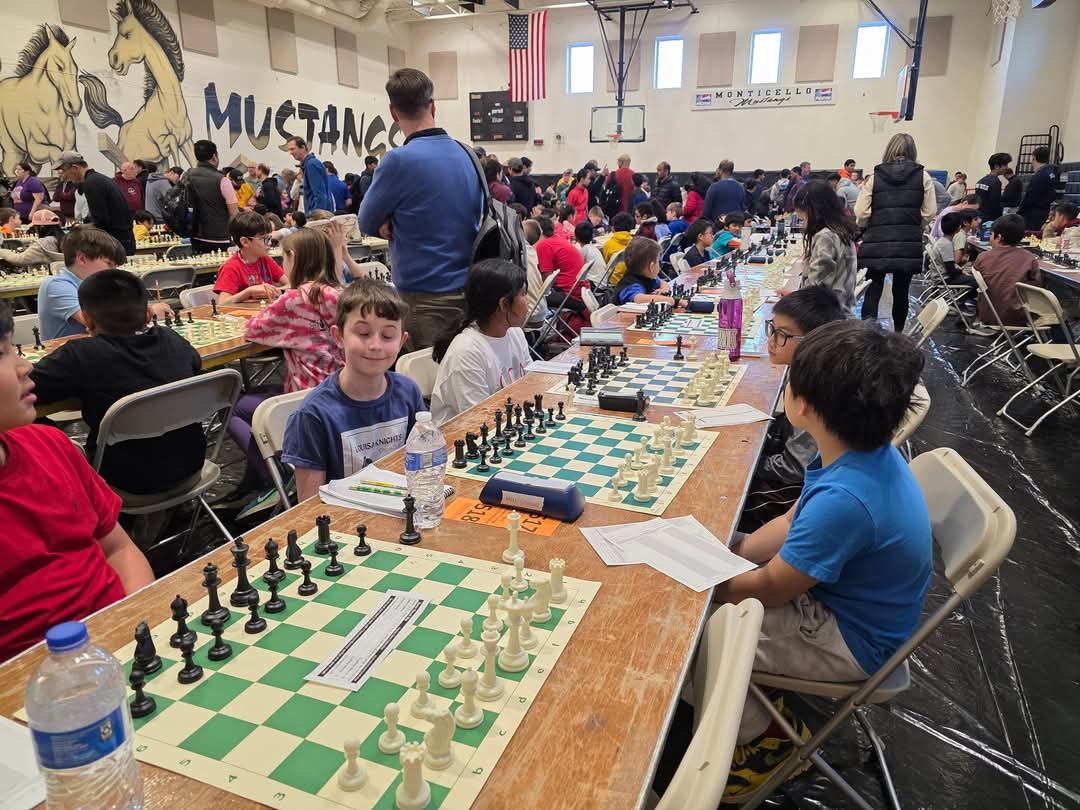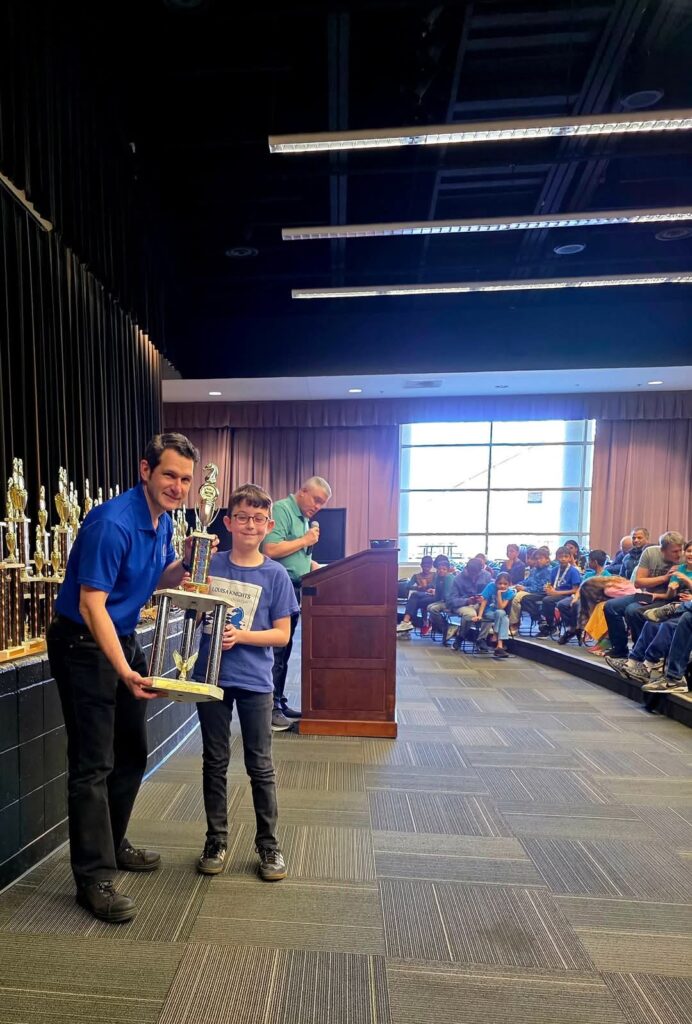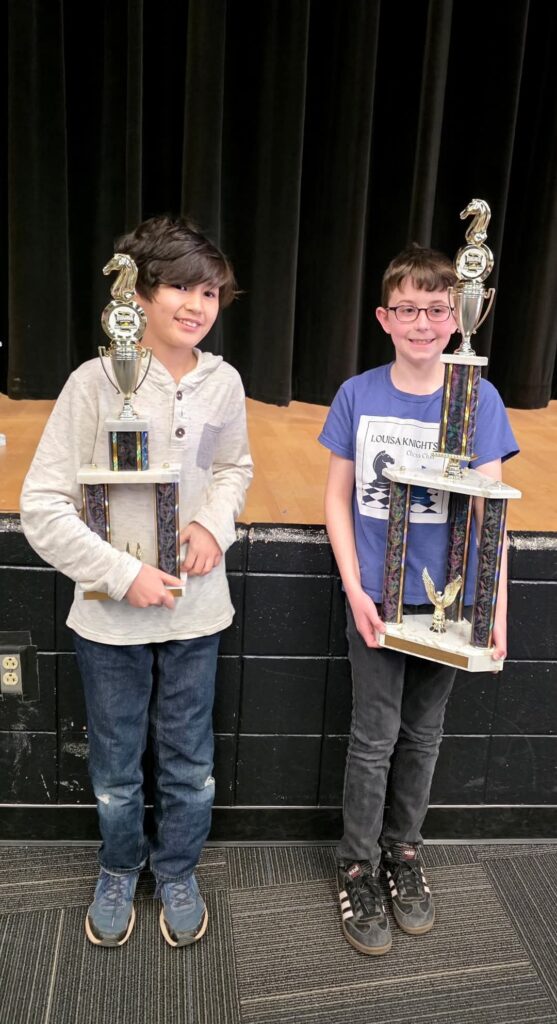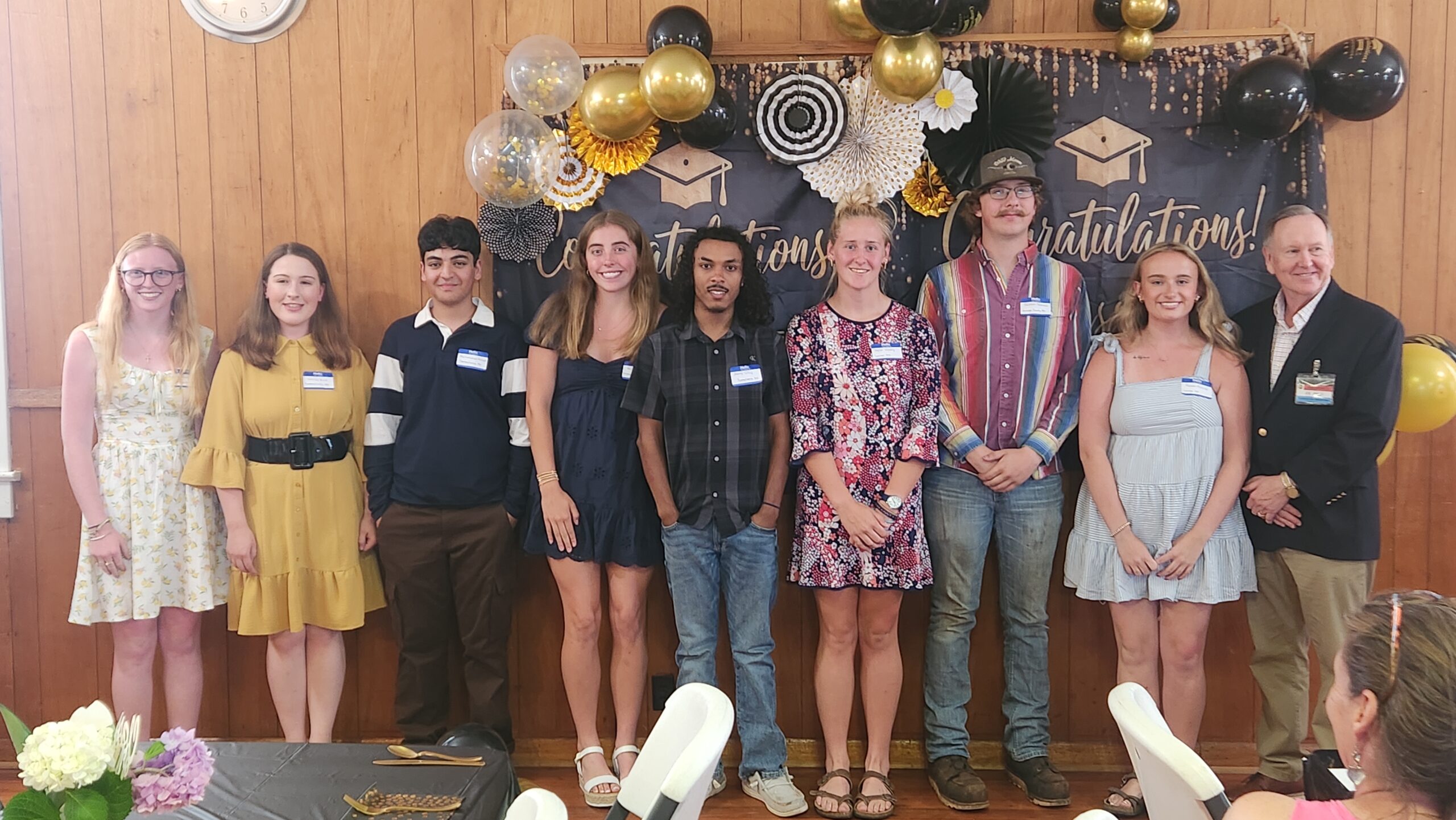
The Louisa Knights Chess Club attended Virginia’s Annual K-12 Scholastic State Chess Tournament on March 8th and 9th in Charlottesville.



The club, led by Nailya Plaskey, meets at the Louisa County Library once a week for lessons and to play each other in games of chess. Since its inception more than 6 years ago, the Louisa Knights Chess Club has grown to 30+ kids and has a lengthy wait list. The club even has an ongoing internal competition week to week where students vie for the top spot on the club’s leaderboard.
Coach Plaskey recalls her family’s early years of attending competitions with her oldest daughter. “We started attending tournaments almost 9 years ago now, when Elina was just 6. At first, she couldn’t sit still for 10 minutes. Learning to sit still and focus on one game for hours really helped her build the patience needed to be successful at chess and in other areas of life,” says Plaskey.
Elina shares that she has played a 4-hour game of chess in a tournament before. “I didn’t get out until 11 o’clock that night, then I had to come back the next morning for more rounds!”
Every player is a little different and has their own style of play. Elina says she likes using one of two different openings when she plays. “I like to be on the attack.” About her brother, she says, “he likes to study endgames, so he’s very good with those.”
Though the Plaskey family began entering tournaments without a team, Coach Plaskey admits, “it’s nice for the kids to get to do it with their friends.”
This year, because of the number of kids in attendance, the team upgraded to a semi-private team room for the first time. The Knights shared the room with students from the ACTs homeschool co-op chess class in Charlottesville, of which there is some overlap in student enrollment.
Concerning the merits of the game, Plaskey says, “chess is such a multifaceted game. It works both parts of your brain. You have to be good not only at the technical aspects of the game, but also be creative, flexible, and smart. There is an art to it. There are basically unlimited variations [in how to play the game]. You can always challenge yourself and get better. It’s a puzzle. If your mind is inclined toward solving puzzles, then chess is the game for you,” says Plaskey. “It gives immediate feedback. You don’t have to guess about your skill level. Your ratings reflect your play. It’s an individual game and you can’t blame anyone else for your results.”
The top players’ boards at the state tournament were aired live on Chess.com and LiChess using electronic boards. Several players from the team room played on virtual boards during the tournament, including Plaskey’s son Alan. “It’s nerve-wracking watching your child play on a virtual board, especially when the player they are playing is a worse rated player, because you can see in real time every move your child makes with an analysis of each move. It’s hard when you see your kid make a move knowing there was a better move they could have made.”
“Parent patience grows along with the kids’,” explains Plaskey. “Though the top games are played on virtual boards, you usually don’t know what’s going on in the room until the kids come out and let you know. After 9 years I’m finally feeling a little less stressed during the tournaments. I know my kids are better players than me. I know they will win some and lose some, but still it is emotional.”
Coach Plaskey assesses when kids in the club are ready to push to the next level and enter into the competitive chess tournament world. Danielle Campbell was persuaded by Plaskey in the past year to sign her kids up for chess tournaments with the team.
Campbell shares that “playing in a girls only chess tournament really helped Delilah when entering competitions for the first time.” The Girls Rock tournament gave Delilah confidence to attend other tournaments. Though chess is a game played just between two opponents, teammates find a lot of camaraderie through the shared experience, sometimes traveling and staying overnight together for the multi-day tournaments. “As part of the Girls Rock tournament, Delilah got to go swimming at the rec center and rock climbing. There were also art contests and fun swag to give away. The teammates spent some time at the beach together during the tournament weekend, as well.”
“Being in tournaments has definitely led to Ryan being more enthusiastic about winning,” shares Susan Stacey, grandmother to another one of the team’s competitors. “He has won trophies and even money! The first thing Ryan does when he wakes up is play chess.”
Kimberly Kim, the coach from Charlottesville sharing the team room, brought several students this year to the state tournament for their first tournament ever. “Teaching kids early moves and seeing them win games using those techniques is one of my favorite things about teaching chess,” Kim says. “Kids get excited to buy notation notebooks and learn to notate for themselves. Seeing the lightbulb moments where they are finding ways to use what they’ve learned in a match is exciting.”
Many trophies came home with students from both teams at the end of the March tournament. Several students placed in the top spots, including a fifth place finish in the K-5 Under 1000 division for Donovan Christian, a top player under a 700 rating in the K-8 Under 1200 section for Leila Plaskey, and a fifth place finish for seven-year-old Sebastian Kim in his first tournament ever as part of the K-3 Under 600 division.
In May several of the kids who competed in the state chess tournament will travel to Orlando, Florida to take part in SuperNationals VIII, a tournament that is only held once every four years. I guess you could say it’s like the Olympics of youth chess in that way. “It’s my one and only shot, since I will have aged out of scholastic by the time it comes around again,” says Elina.
We wish all the students good luck this year as they continue their chess journeys.

Jennifer Christian is a Lake Anna watercolor artist and designer. Coming from the Detroit area in early 2019, she fell in love with the natural beauty of the lake and surrounding fields and forests. Much of her artwork looks to capture the essence of the lake and its surroundings. Known for her community-minded entrepreneurial spirit, she is the creative mind behind Lake Anna-opoly, a beloved board game inspired by the local businesses and organizations of Lake Anna. Jennifer’s game has become a local favorite and has brought joy to rainy days for many families and friends in our community. Jennifer’s paintings, prints, greeting cards, and other merchandise can be found in stores around town and on her website at jenniferchristianart.com. She has also worked with several local organizations and businesses on the logo and sign designs you see around town. Outside of her artistic endeavors, Jennifer is a devoted mother to two boys and wife to Jonathan Christian, founder of LASER Robotics and the LASA Soccer Challenge Program. In addition, she founded and oversees the Lake Anna Homeschool group.
Subscribe for Updates
Sponsors
latest articles
Plan Ahead for a Safe and Sober Holiday Weekend on the Water [Photo Gallery]
![Featured image for “Plan Ahead for a Safe and Sober Holiday Weekend on the Water [Photo Gallery]”](https://lakeanna.online/wp-content/uploads/2025/06/DFW-RIde-Along-8104.jpg)
Fully Community-Funded Rescue Boat Brings Life-Saving Power to the Water

[Sponsored] Holmes on Homes: Business Built on Trust, Grit and Quality
![Featured image for “[Sponsored] Holmes on Homes: Business Built on Trust, Grit and Quality”](https://lakeanna.online/wp-content/uploads/2025/06/FinalHolmes-1.jpg)
Jet Boat Community Celebrates Service and Safety at 2025 Lake Anna Invasion

Best of Lake Anna Corrections & Announcements

Barometric Tides, Explained

The Louisa Knights Chess Club attended Virginia’s Annual K-12 Scholastic State Chess Tournament on March 8th and 9th in Charlottesville.



The club, led by Nailya Plaskey, meets at the Louisa County Library once a week for lessons and to play each other in games of chess. Since its inception more than 6 years ago, the Louisa Knights Chess Club has grown to 30+ kids and has a lengthy wait list. The club even has an ongoing internal competition week to week where students vie for the top spot on the club’s leaderboard.
Coach Plaskey recalls her family’s early years of attending competitions with her oldest daughter. “We started attending tournaments almost 9 years ago now, when Elina was just 6. At first, she couldn’t sit still for 10 minutes. Learning to sit still and focus on one game for hours really helped her build the patience needed to be successful at chess and in other areas of life,” says Plaskey.
Elina shares that she has played a 4-hour game of chess in a tournament before. “I didn’t get out until 11 o’clock that night, then I had to come back the next morning for more rounds!”
Every player is a little different and has their own style of play. Elina says she likes using one of two different openings when she plays. “I like to be on the attack.” About her brother, she says, “he likes to study endgames, so he’s very good with those.”
Though the Plaskey family began entering tournaments without a team, Coach Plaskey admits, “it’s nice for the kids to get to do it with their friends.”
This year, because of the number of kids in attendance, the team upgraded to a semi-private team room for the first time. The Knights shared the room with students from the ACTs homeschool co-op chess class in Charlottesville, of which there is some overlap in student enrollment.
Concerning the merits of the game, Plaskey says, “chess is such a multifaceted game. It works both parts of your brain. You have to be good not only at the technical aspects of the game, but also be creative, flexible, and smart. There is an art to it. There are basically unlimited variations [in how to play the game]. You can always challenge yourself and get better. It’s a puzzle. If your mind is inclined toward solving puzzles, then chess is the game for you,” says Plaskey. “It gives immediate feedback. You don’t have to guess about your skill level. Your ratings reflect your play. It’s an individual game and you can’t blame anyone else for your results.”
The top players’ boards at the state tournament were aired live on Chess.com and LiChess using electronic boards. Several players from the team room played on virtual boards during the tournament, including Plaskey’s son Alan. “It’s nerve-wracking watching your child play on a virtual board, especially when the player they are playing is a worse rated player, because you can see in real time every move your child makes with an analysis of each move. It’s hard when you see your kid make a move knowing there was a better move they could have made.”
“Parent patience grows along with the kids’,” explains Plaskey. “Though the top games are played on virtual boards, you usually don’t know what’s going on in the room until the kids come out and let you know. After 9 years I’m finally feeling a little less stressed during the tournaments. I know my kids are better players than me. I know they will win some and lose some, but still it is emotional.”
Coach Plaskey assesses when kids in the club are ready to push to the next level and enter into the competitive chess tournament world. Danielle Campbell was persuaded by Plaskey in the past year to sign her kids up for chess tournaments with the team.
Campbell shares that “playing in a girls only chess tournament really helped Delilah when entering competitions for the first time.” The Girls Rock tournament gave Delilah confidence to attend other tournaments. Though chess is a game played just between two opponents, teammates find a lot of camaraderie through the shared experience, sometimes traveling and staying overnight together for the multi-day tournaments. “As part of the Girls Rock tournament, Delilah got to go swimming at the rec center and rock climbing. There were also art contests and fun swag to give away. The teammates spent some time at the beach together during the tournament weekend, as well.”
“Being in tournaments has definitely led to Ryan being more enthusiastic about winning,” shares Susan Stacey, grandmother to another one of the team’s competitors. “He has won trophies and even money! The first thing Ryan does when he wakes up is play chess.”
Kimberly Kim, the coach from Charlottesville sharing the team room, brought several students this year to the state tournament for their first tournament ever. “Teaching kids early moves and seeing them win games using those techniques is one of my favorite things about teaching chess,” Kim says. “Kids get excited to buy notation notebooks and learn to notate for themselves. Seeing the lightbulb moments where they are finding ways to use what they’ve learned in a match is exciting.”
Many trophies came home with students from both teams at the end of the March tournament. Several students placed in the top spots, including a fifth place finish in the K-5 Under 1000 division for Donovan Christian, a top player under a 700 rating in the K-8 Under 1200 section for Leila Plaskey, and a fifth place finish for seven-year-old Sebastian Kim in his first tournament ever as part of the K-3 Under 600 division.
In May several of the kids who competed in the state chess tournament will travel to Orlando, Florida to take part in SuperNationals VIII, a tournament that is only held once every four years. I guess you could say it’s like the Olympics of youth chess in that way. “It’s my one and only shot, since I will have aged out of scholastic by the time it comes around again,” says Elina.
We wish all the students good luck this year as they continue their chess journeys.

Jennifer Christian is a Lake Anna watercolor artist and designer. Coming from the Detroit area in early 2019, she fell in love with the natural beauty of the lake and surrounding fields and forests. Much of her artwork looks to capture the essence of the lake and its surroundings. Known for her community-minded entrepreneurial spirit, she is the creative mind behind Lake Anna-opoly, a beloved board game inspired by the local businesses and organizations of Lake Anna. Jennifer’s game has become a local favorite and has brought joy to rainy days for many families and friends in our community. Jennifer’s paintings, prints, greeting cards, and other merchandise can be found in stores around town and on her website at jenniferchristianart.com. She has also worked with several local organizations and businesses on the logo and sign designs you see around town. Outside of her artistic endeavors, Jennifer is a devoted mother to two boys and wife to Jonathan Christian, founder of LASER Robotics and the LASA Soccer Challenge Program. In addition, she founded and oversees the Lake Anna Homeschool group.
Subscribe for Updates
Sponsors
latest articles
Plan Ahead for a Safe and Sober Holiday Weekend on the Water [Photo Gallery]
![Featured image for “Plan Ahead for a Safe and Sober Holiday Weekend on the Water [Photo Gallery]”](https://lakeanna.online/wp-content/uploads/2025/06/DFW-RIde-Along-8104.jpg)
Fully Community-Funded Rescue Boat Brings Life-Saving Power to the Water

[Sponsored] Holmes on Homes: Business Built on Trust, Grit and Quality
![Featured image for “[Sponsored] Holmes on Homes: Business Built on Trust, Grit and Quality”](https://lakeanna.online/wp-content/uploads/2025/06/FinalHolmes-1.jpg)
Jet Boat Community Celebrates Service and Safety at 2025 Lake Anna Invasion

Best of Lake Anna Corrections & Announcements

Barometric Tides, Explained


Belmont Ruritan Clubs Award $26,000 in Scholarships to Local Seniors
Article By Jen Bailey

Exclusive Golf Excursions for Cutalong Members
Article By Jen Bailey






